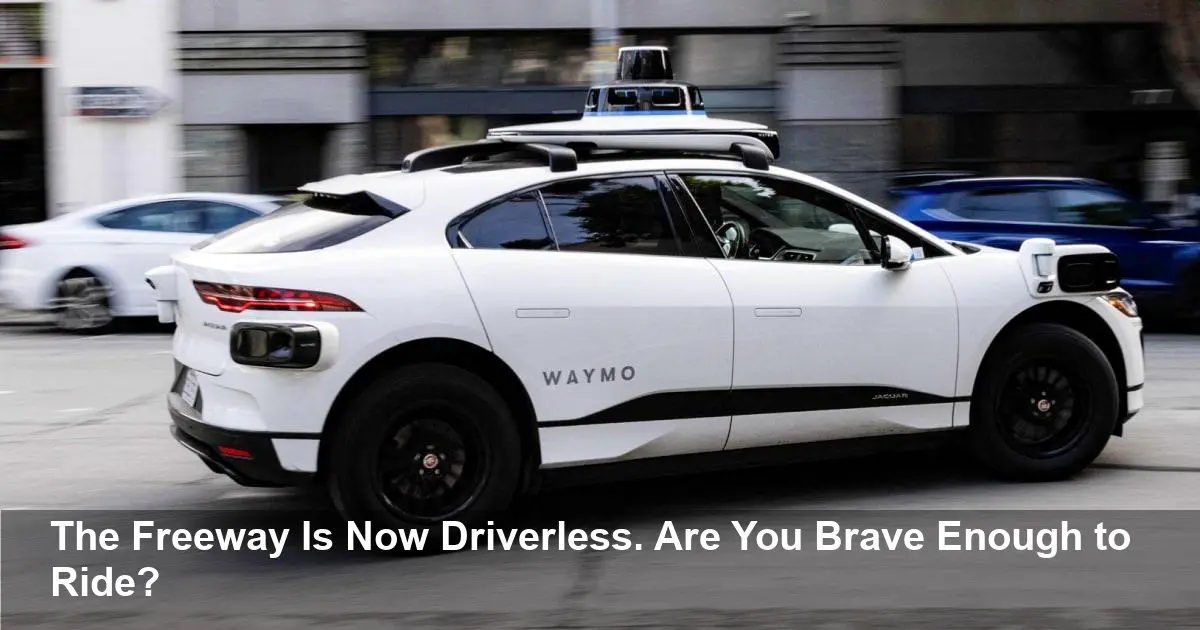Waymo Unleashes Robotaxis on Freeways: Is It Safe?

- Waymo has launched fully driverless taxi services on freeways in Phoenix, Los Angeles, and the San Francisco Bay Area.
- The move to higher speeds comes after years of testing, but experts express "guarded optimism" due to increased risks.
- Waymo appears to be the first company in the U.S. to offer fully autonomous, fare-paying rides on highways, placing it ahead of competitors like Tesla and Zoox.
- Despite Waymo's strong safety record, the shadow of competitor Cruise's major incidents looms over the industry, raising public safety questions.
A New Era for Autonomous Travel
The self-driving car company Waymo announced a landmark expansion of its robotaxi service, confirming it will now transport paying customers on freeways. This significant step for autonomous vehicles will roll out in major operational zones, including Los Angeles, Phoenix, and the San Francisco Bay Area, marking a pivotal transition from controlled city streets to the complex, high-speed environment of highways.
Previously, Waymo’s services were confined to surface streets as the company worked to perfect its technology for faster speeds. "This has been a long time in the making," said Waymo co-CEO Dmitri Dolgov, emphasizing the difficulty of mastering freeway autonomy. "Freeway driving is one of those things that’s very easy to learn but very hard to master when we’re talking about full autonomy."
A Calculated Risk?
While Waymo is confident in its system, experts remain cautiously optimistic. Wendy Ju, an associate professor at Cornell University, noted that while freeways have fewer variables like pedestrians, the stakes are much higher. "The higher speed does pose a much higher risk," she said. "In order to predict what’s going to happen 10 seconds from now, the car has to sense what’s happening much farther down the road."
To build confidence, Waymo provided a 40-minute test ride to an NBC News reporter, during which the vehicle successfully navigated freeway traffic, merging, and congestion without incident. The company stated it has been testing the service with employees for over a year before this public launch.
Navigating Safety and Public Trust
The expansion comes as the robotaxi industry faces intense scrutiny. The cautionary tale of Cruise, a former GM subsidiary whose permit was revoked after a vehicle dragged a pedestrian, highlights the severe consequences of failure. While Waymo vehicles have been involved in minor incidents, such as striking a cat, the company maintains a strong safety record, recently surpassing 100 million miles of driving without a human behind the wheel and no human fatalities.
Srikanth Saripalli, a director at Texas A&M University’s Center for Autonomous Vehicles, praised Waymo’s safety record as "amazing" but pointed out that the company has operated in ideal conditions. "In Phoenix, the roads are all perpendicular, the roads are nice, the weather is nice, and it still took them almost a decade to get to a freeway," he remarked, suggesting that colder, more complex cities will be the next major test.
The Road Ahead
Waymo’s freeway-capable taxis will strictly adhere to posted speed limits, even when surrounding human drivers do not. The company is also pushing forward with broader expansion plans, including service to San Jose’s airport and adding new cities like Denver to its map. As thousands of riders get their first chance to experience a driverless highway trip, the industry will be watching to see if Waymo’s bold move pays off and cements public trust in an autonomous future.





